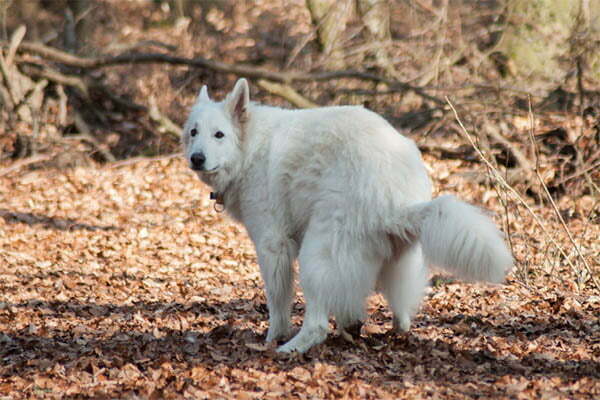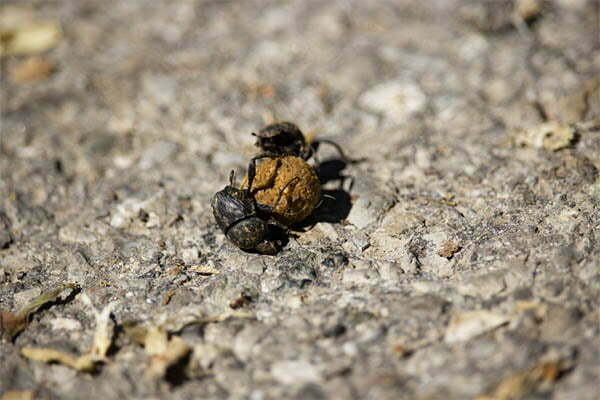There are two types of people in the world. There are people who want to bag it, bin it, and never think about it again. And there are the people who study it closely – knowing that your dog’s poop can give us an unrivaled insight into their health.

Whether you spend 2 seconds or 2 minutes looking at your dog’s poop – the topic we’re talking about today is pretty hard to ignore.
Little black bugs crawling around in your dog’s poop sounds like the stuff of nightmares. And we’ll be the first to admit it’s a pretty disturbing sight.
Thankfully, this is a pretty rare occurrence, one that most dog owners won’t experience in their lifetime.
However, we’re guessing from the fact that you have found this answer that you are one of the unlucky ones, and you’re looking for help.
Our experience of encountering these poop-dwelling beetles once was enough to make us never want to see them again.
We were determined to solve this problem as quickly as we could, and so we took a deep dive into researching all things black bugs.
We quickly discovered that there wasn’t one single reason why black bugs can appear in a dog’s poop. Reasons can include but are not limited to: dung beetles, dried spots of blood, ants, and much more.
This article is a culmination of all the research we did to help our dog. Carry on reading to discover why there are black bugs in your dog’s poop…
Identify the ‘bugs’
The first thing that you need to do to start solving this issue is a little disgusting. But as you face your fears, remind yourself that it is for the good of your dog.
As your dogs can have small black dots in their poop for multiple reasons, it is very important you identify the dots because giving your dog any treatment. You do not want to give them any form of medication they do not need.
It is best to wear gloves while investigating the poop. This will help to prevent you from getting sick during the process. You should also wash your hands before touching anything else.
If you do not want to investigate the poop in public, then you may want to bag it up and bring it home with you.
If there are bugs on the poop, it will be immediately obvious. These bugs are most likely to be ants or dung beetles, as these species are very attracted to the smell that dog feces produces.
If you cannot see bugs, then you will need to take a closer look.
While wearing your gloves, break apart a small amount of the poop. This will give you a better idea of what is going on throughout the poop. If you see inanimate black dots in the poop, then it could be one of two things: something your dog has eaten or dried blood in their feces.
What could the bugs be?
In this next section, we are going to look at how you can identify these bugs and how to stop this from happening again.
Dung beetles
You may be surprised to hear this, but dung beetles are very common in many areas of the world, including the United States. Other places they populate include South Africa, Mexico, and Australia.
If you spot dung beetles on your dog’s poop, then there is nothing to worry about! Poop is their natural habitat. It is most likely that they are looking for material to build their homes for and for something to eat.
Many people see dung beetles as pests and dirty creatures – however, they are far from it.
Dung beetles provide a valuable service for the areas they live in. And thanks to the work of the dung beetle, these areas have more fertile soil and a cleaner environment.
How do dung beetles do this?

Dung beetles perform a similar role to worms in the ecosystem. They break down animal feces and redistribute the nutrients into the soil.
This makes the soil in their area more fertile and reduces the need for the fields to be rested. The most important nutrient that they redistribute is nitrogen, which is essential for healthy plant growth.
Dung beetles also use large deposits of poop to make their homes and nests out of.
The male dung beetle will burrow directly under the poop, making a sheltered cave.
The female dung beetle will then lay her eggs inside this cave.
Poop also has another key role in the dung beetle reproductive system. Small balls of poop are used to woo mates.
The males give the females these balls (they will make them themselves), and if the female is impressed by the gift, she will mate with the male. He will then be sent off to build one of the caves that we mentioned above.
The dung beetles do the dogs no harm and will make your local walking route cleaner and more fertile.
Therefore, if you see dung beetles on your dog’s poop then you have nothing to worry about. While, legally, you should clean up your dog’s poop you should consider leaving a small amount for your friendly, local dung beetle for his lunch.
Something they ate
If you find inanimate black dots in your dog’s poop then the cause of this will most likely be because they have eaten something they should not have.
Contrary to urban myths, dogs can’t just eat anything. There are many things that will cause their stomachs to have adverse reactions. Many dogs have gluten allergies, and some are even allergic to things like chicken.
When dogs eat something they are not meant to, most of the time their stomach cannot digest it. Pumpkin seeds are a classic example of this, as well as quinoa.
The undigested pieces of food often look like small black dots or bugs in your dog’s poop. Dogs are very good at naturally expelling toxins, so these black dots in their poop are nothing to worry about.
Ants
You may notice ants in, on, or around your dog’s poop.
This is nothing to worry about.
Like dung beetles, ants are naturally drawn to dog poop because of its contents and its smell. Dog poop is a good source of food for ants as they will often find substantial deposits of undigested food in the poop.
Some species of ants have also been known to use poop as a building material for their nests.
Following on from our last section, if you find dead ants in your dog’s poop then you have no reason to worry. As we mentioned earlier, dogs are notorious for eating things they shouldn’t – ants and anthills included.
While ants cannot survive a dog’s digestive tract, their bodies are often not broken down by the process.
Therefore there is nothing to worry about if your dog’s poop has dead ants on it. They probably snacked on an anthill or a piece of food that had ants on it.
Blood
The only time you need to worry about seeing black dots in your dog’s feces is if the dots are actually dried flakes of blood.
While this is not always something to be worried about, if you find blood in your dog’s poops, then you should take them to see a vet as soon as you can.
Why might a dog have blood in its poop?
There are many reasons why a dog might have blood in its poop. If you see blood in your puppy’s poop then you should make an emergency appointment with your vet.
If you notice both red and black blood in your dog’s poop, then the blood has come from somewhere in the lower digestional tract or colon.
This type of bright red blood is called Hematochezia.
The most common source of this type of blood is due to diarrhea. Your dog’s intestinal tracts have taken quite a beating from the illness, and some blood vessels have been burst along the way.
This also happens with humans, and there is not a huge amount to worry about unless the bleeding continues over multiple days.
It is also possible for dogs to get IBS (inflammatory bowel syndrome). It is very similar to the disease in humans. Eating the wrong type of food or stress can trigger stomach issues, including twisting in the bowls.
This twisting can cause mirror tears in the intestines. This is what causes the blood. You can talk to your vet about trying to prevent IBS flare-ups in your dog.
If the blood is darker then you will want to speak to your vet as soon as you can. Blood in the stool can be an indication of something more serious.
It can be a sign of internal injury or infections. You might see both blood and pus in the stool if this is the case. These infections can be both viral or bacterial.
Blood in your dog’s poop can also be a sign that they have a stomach laceration or ulcer. These are not typically deadly but can be very painful for your dog.
Thankfully, treatments are quick and non-invasive.
Finally, darker blood in the stool can be a sign of more serious issues like cysts and cancer. If you have an older dog, then you may want to talk to your vet on the same day you spot the blood.
The vets will be able to tell a lot by looking at the stool sample. They may need to do further tests as well.
If you see blood in your dog’s poop then you should talk to your vet about it. Bag the poop but do not bin it, as the vet will want to have a look at it.
Conclusion
Spotting black bugs in your dog’s poop don’t always mean your dog is sick. There are many other reasons why these bugs might be drawn to said poop.
These black bugs could be dung beetles or ants that have been drawn to the poop by its smell and contents.
There may be no bugs at all in your dog’s poop. Rather small pieces of half digest ‘foot’. Dogs have a habit of eating things that shouldn’t, and this often results in their poop looking very bizarre.
The most important thing you can do is inspect your dog’s poop if you think you see black bugs in it. Sometimes spots of dried blood (which look like small, black lumps) can be mistaken for bugs.
If you spot dried blood in your dog’s feces you should take them to see their vet as soon as possible.
